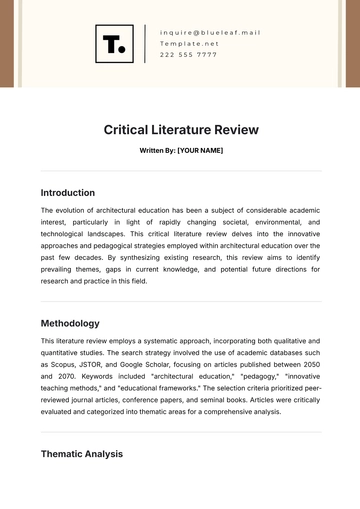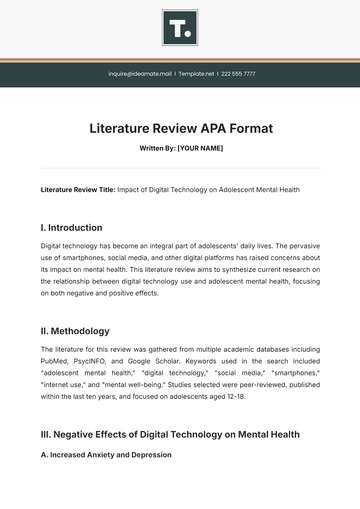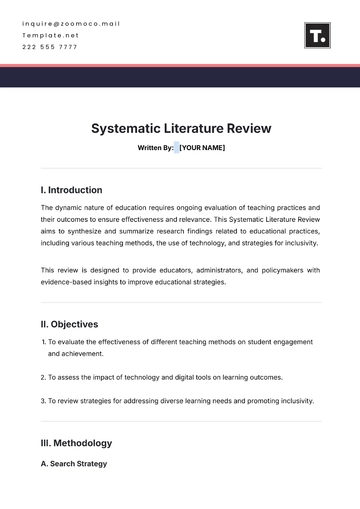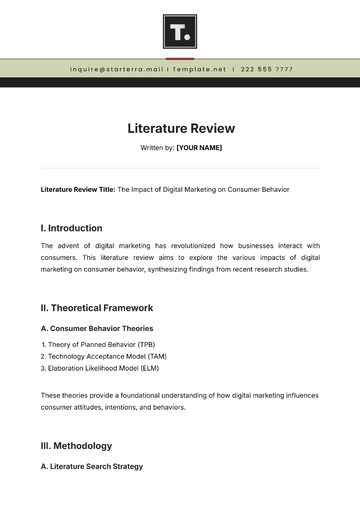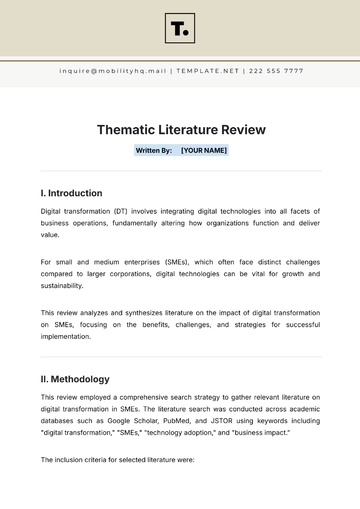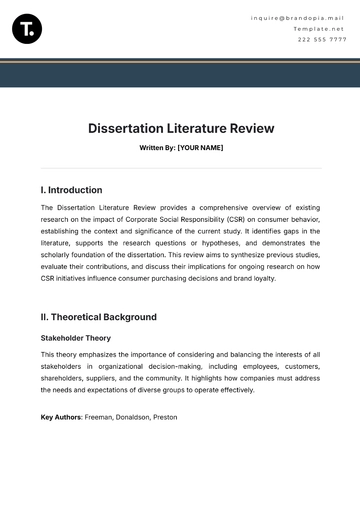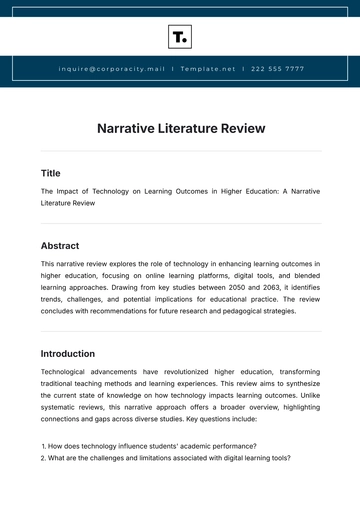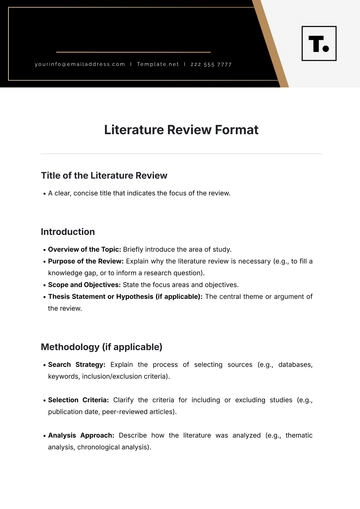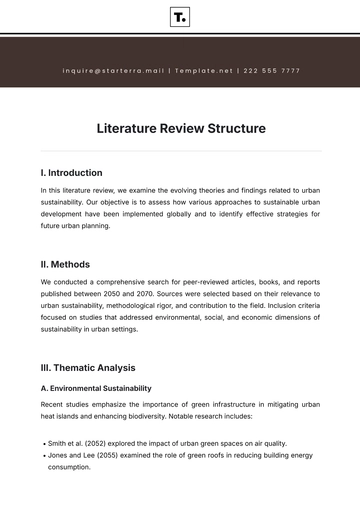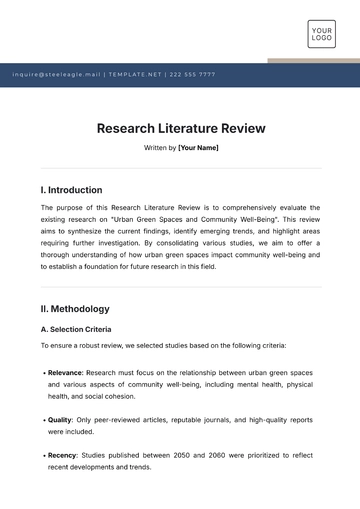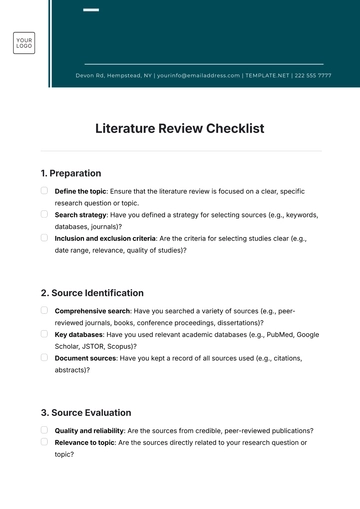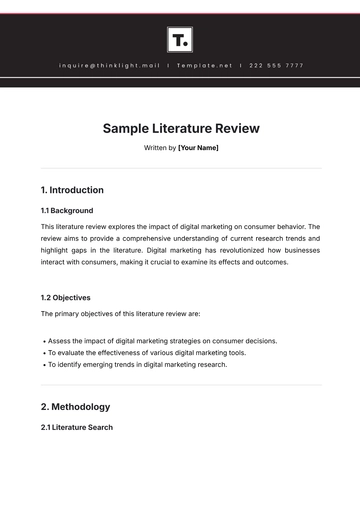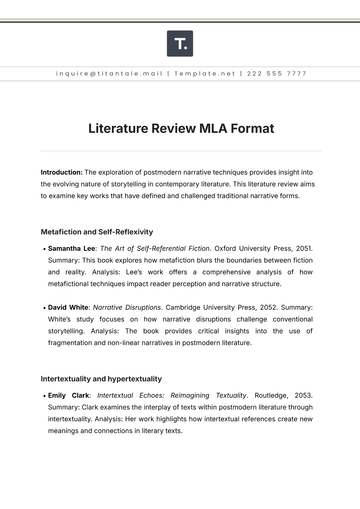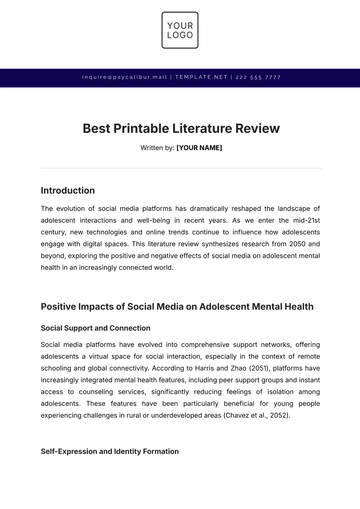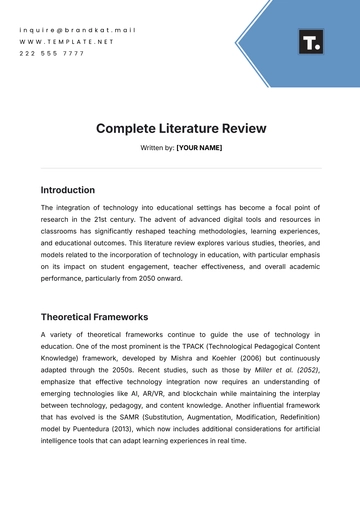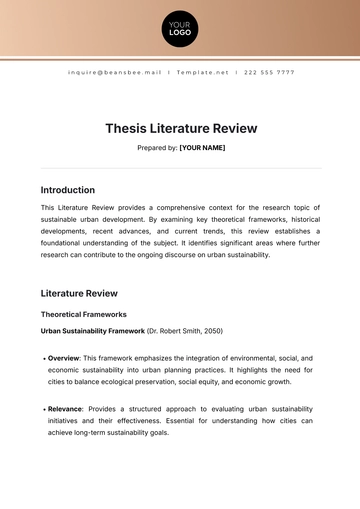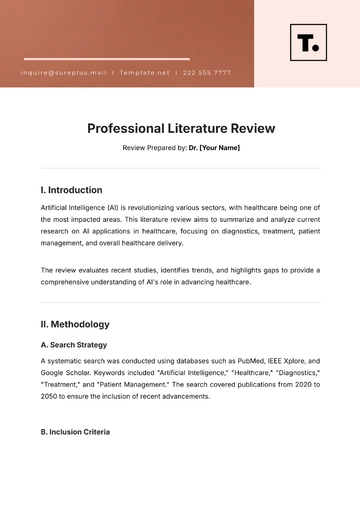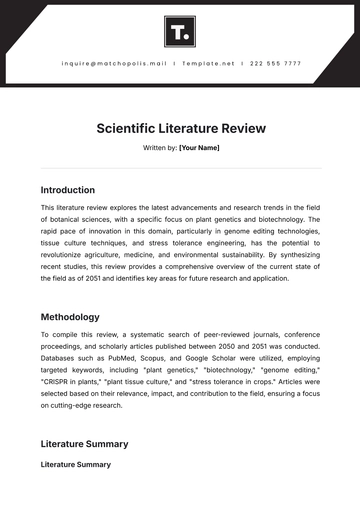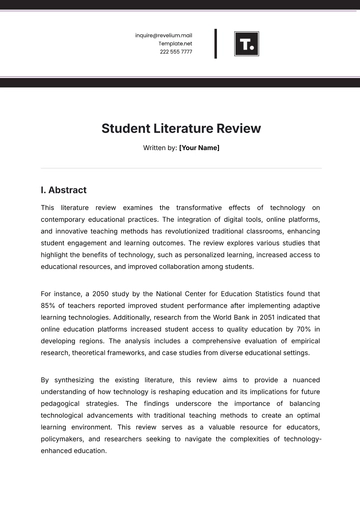Free Thematic Literature Review
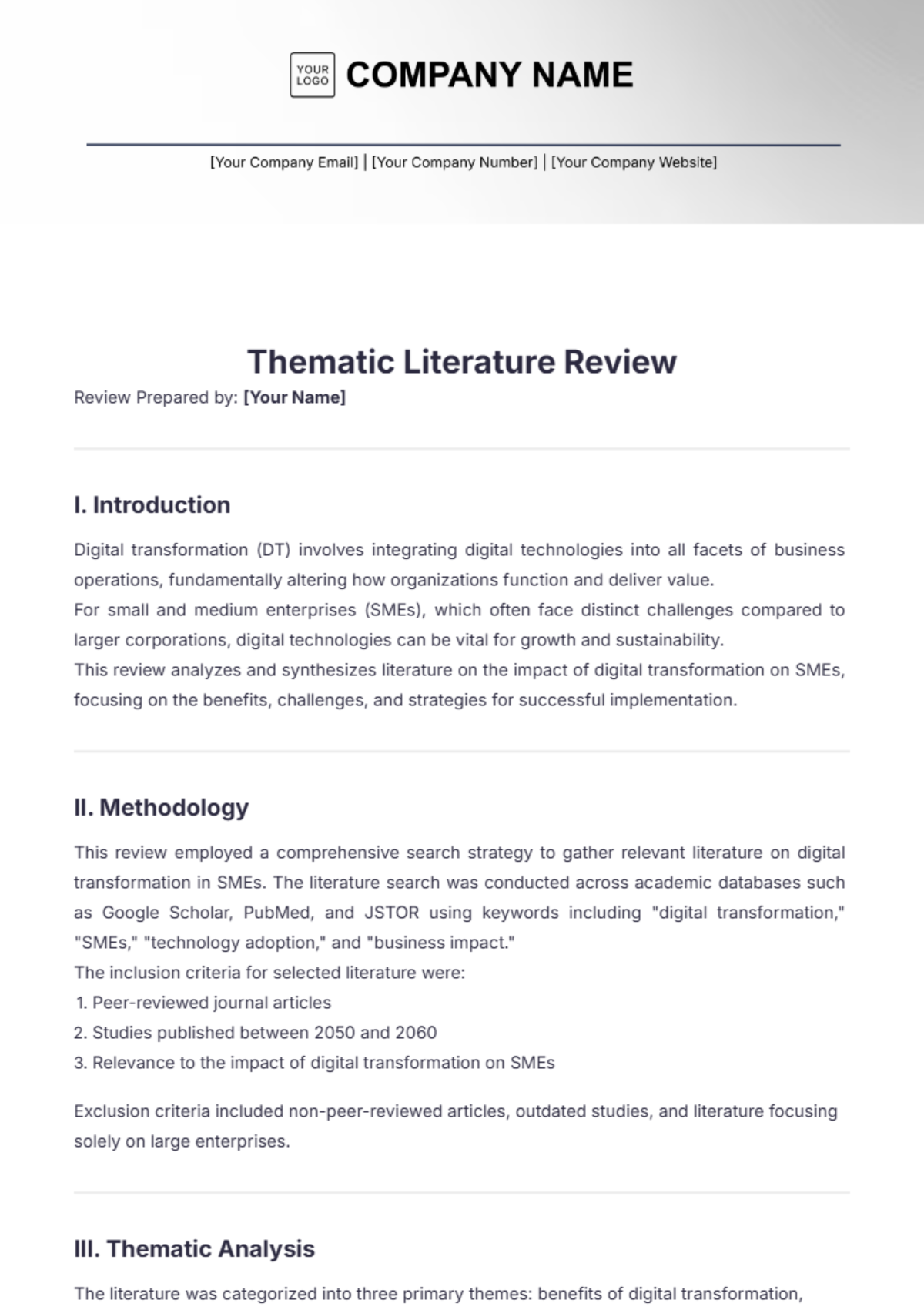
Written By: [YOUR NAME]
I. Introduction
Digital transformation (DT) involves integrating digital technologies into all facets of business operations, fundamentally altering how organizations function and deliver value.
For small and medium enterprises (SMEs), which often face distinct challenges compared to larger corporations, digital technologies can be vital for growth and sustainability.
This review analyzes and synthesizes literature on the impact of digital transformation on SMEs, focusing on the benefits, challenges, and strategies for successful implementation.
II. Methodology
This review employed a comprehensive search strategy to gather relevant literature on digital transformation in SMEs. The literature search was conducted across academic databases such as Google Scholar, PubMed, and JSTOR using keywords including "digital transformation," "SMEs," "technology adoption," and "business impact."
The inclusion criteria for selected literature were:
Peer-reviewed journal articles
Studies published between 2050 and 2060
Relevance to the impact of digital transformation on SMEs
Exclusion criteria included non-peer-reviewed articles, outdated studies, and literature focusing solely on large enterprises.
III. Thematic Analysis
The literature was categorized into three primary themes: benefits of digital transformation, challenges faced by SMEs, and strategies for successful implementation.
Benefits of Digital Transformation
The literature highlights several benefits for SMEs:
Operational Efficiency: Digital tools such as Customer Relationship Management (CRM) systems automate routine tasks, reducing operational costs and errors. For instance, CRM systems streamline customer interactions, leading to faster response times and improved customer satisfaction.
Customer Engagement: Digital platforms enable SMEs to reach a wider audience and interact with customers more effectively. Channels like social media, email marketing, and e-commerce platforms provide new opportunities for engagement and sales.
Market Competitiveness: Adopting advanced technologies helps SMEs compete with larger firms by enhancing agility and responsiveness. Innovations such as AI-driven analytics offer valuable insights that guide strategic decisions.
Representative studies:
Smith, J. (2055). Efficiency Gains from Digital Transformation in SMEs. Journal of Business Research.
Lee, K. (2056). Customer Engagement and Technology: A Study of SMEs. Marketing Insights.
Challenges Faced by SMEs
SMEs encounter several challenges in digital transformation:
Financial Constraints: The cost of technology and infrastructure can be prohibitive for smaller businesses. Many SMEs struggle to allocate sufficient funds for initial technology investments.
Resistance to Change: Organizational culture and employee resistance are significant barriers. Staff may be reluctant to adopt new technologies or alter established workflows.
Technical Expertise: SMEs often lack the in-house expertise required for effective technology implementation and management, necessitating external support or partnerships.
Representative studies:
Patel, R. (2054). Barriers to Digital Adoption in Small Businesses. International Journal of Innovation Management.
Gomez, L. (2055). Overcoming Resistance: Digital Transformation in SMEs. Technology and Business Review.
Strategies for Successful Implementation
Successful digital transformation requires strategic approaches:
Incremental Adoption: Implementing digital technologies in phases helps manage costs and minimize disruption. This approach allows businesses to assess the impact of each technology before full-scale implementation.
Employee Training: Investing in training programs ensures employees are equipped to use new tools effectively. Training can reduce resistance and improve productivity.
Partnerships: Collaborating with technology providers can offer SMEs access to specialized knowledge and support, addressing technical challenges and reducing implementation risks.
Representative studies:
Johnson, M. (2057). Successful Strategies for Digital Transformation. Journal of SME Management.
Brown, A. (2058). Training and Technology Partnerships: Keys to Success. Business Strategy Journal.
IV. Discussion
Benefits of Digital Transformation
The reviewed literature underscores several advantages for SMEs:
Operational Efficiency: Digital tools automate tasks, leading to cost savings and operational improvements.
Customer Engagement: Digital platforms offer new ways to engage with customers and expand market reach.
Market Competitiveness: Advanced technologies improve SMEs' agility and responsiveness, enhancing their competitive edge.
Challenges Faced by SMEs
Key challenges include:
Financial Constraints: High costs of technology and infrastructure.
Resistance to Change: Organizational and employee resistance to new technologies.
Technical Expertise: Limited in-house expertise requiring external support.
Strategies for Successful Implementation
Effective strategies include:
Incremental Adoption: Gradual implementation to manage costs and disruptions.
Employee Training: Ensuring effective use of new technologies through training.
Partnerships: Leveraging technology providers for specialized support.
V. Conclusion
Digital transformation offers significant opportunities for SMEs, including improved operational efficiency, enhanced customer engagement, and increased market competitiveness.
However, SMEs also face challenges such as financial constraints, resistance to change, and limited technical expertise.
By adopting incremental implementation approaches, investing in training, and forming strategic partnerships, SMEs can effectively navigate the complexities of digital transformation and leverage its benefits for growth and sustainability.
VI. References
Brown, A. (2058). Training and Technology Partnerships: Keys to Success. Business Strategy Journal.
Gomez, L. (2055). Overcoming Resistance: Digital Transformation in SMEs. Technology and Business Review.
Johnson, M. (2057). Successful Strategies for Digital Transformation. Journal of SME Management.
Lee, K. (2056). Customer Engagement and Technology: A Study of SMEs. Marketing Insights.
Patel, R. (2054). Barriers to Digital Adoption in Small Businesses. International Journal of Innovation Management.
Smith, J. (2055). Efficiency Gains from Digital Transformation in SMEs. Journal of Business Research.
- 100% Customizable, free editor
- Access 1 Million+ Templates, photo’s & graphics
- Download or share as a template
- Click and replace photos, graphics, text, backgrounds
- Resize, crop, AI write & more
- Access advanced editor
Enhance your research with the Thematic Literature Review Template from Template.net. This customizable, downloadable, and printable template ensures a structured approach to your thematic literature reviews. Editable in our AI Editor Tool, it provides a clear framework for organizing themes, sources, and analyses. Optimize your research process with this essential template.
